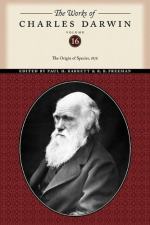This theory is, also, strengthened by some few other facts in regard to instincts; as by that common case of closely allied, but certainly distinct, species, when inhabiting distant parts of the world and living under considerably different conditions of life, yet often retaining nearly the same instincts. For instance, we can understand on the principle of inheritance, how it is that the thrush of South America lines its nest with mud, in the same peculiar manner as does our British thrush: how it is that the male wrens (Troglodytes) of North America, build “cock-nests,” to roost in, like the males of our distinct Kitty-wrens,—a habit wholly unlike that of any other known bird. Finally, it may not be a logical deduction, but to my imagination it is far more satisfactory to look at such instincts as the young cuckoo ejecting its foster-brothers,—ants making slaves,—the larvae of ichneumonidae feeding within the live bodies of caterpillars,—not as specially endowed or created instincts, but as small consequences of one general law, leading to the advancement of all organic beings, namely, multiply, vary, let the strongest live and the weakest die.
CHAPTER 8. HYBRIDISM.
Distinction between the sterility of first crosses and of hybrids. Sterility various in degree, not universal, affected by close interbreeding, removed by domestication. Laws governing the sterility of hybrids. Sterility not a special endowment, but incidental on other differences. Causes of the sterility of first crosses and of hybrids. Parallelism between the effects of changed conditions of life and crossing. Fertility of varieties when crossed and of their mongrel offspring not universal. Hybrids and mongrels compared independently of their fertility. Summary.
The view generally entertained by naturalists is that species, when intercrossed, have been specially endowed with the quality of sterility, in order to prevent the confusion of all organic forms. This view certainly seems at first probable, for species within the same country could hardly have kept distinct had they been capable of crossing freely. The importance of the fact that hybrids are very generally sterile, has, I think, been much underrated by some late writers. On the theory of natural selection the case is especially important, inasmuch as the sterility of hybrids could not possibly be of any advantage to them, and therefore could not have been acquired by the continued preservation of successive profitable degrees of sterility. I hope, however, to be able to show that sterility is not a specially acquired or endowed quality, but is incidental on other acquired differences.
In treating this subject, two classes of facts, to a large extent fundamentally different, have generally been confounded together; namely, the sterility of two species when first crossed, and the sterility of the hybrids produced from them.




